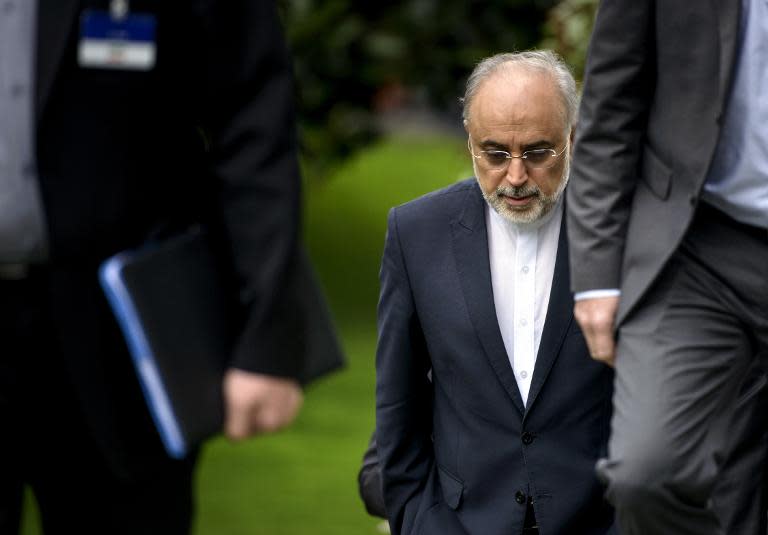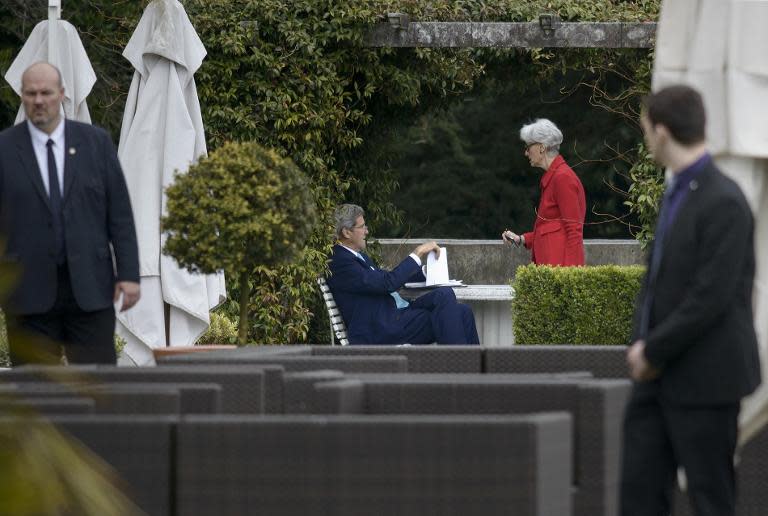Iran talks near close with 'understanding' reached
Marathon talks aimed at agreeing the outlines of a deal putting an Iranian nuclear bomb out of reach neared their close Thursday with global powers preparing to address the media. Following eight days of tortuous discussions in Switzerland, which lasted through the night to Thursday, negotiators were working out the final wording of a statement, diplomats said. It was unclear how detailed this statement to be issued in Lausanne will be, but EU foreign policy chief Federica Mogherini tweeted that it would be "good news". The German foreign ministry tweeted that an "understanding" had been reached on "key points". Mogherini and Iranian Foreign Minister Mohammad Javad Zarif were due to hold a news conference followed by others by foreign ministers including US Secretary of State John Kerry. Zarif tweeted that they had "found solutions". Earlier he said "significant progress" in a night of talks with Kerry and an army of technical and sanctions experts from all sides. The aim before this round began was to agree the main contours of a deal to be finalised by June 30 that reduces in scale Iran's nuclear programme in return for relief from painful sanctions. The powers hope that this will make it virtually impossible for Iran to make nuclear weapons under the guise of its civilian programme and end a crisis raging for 12 years. - High stakes - The stakes were high, French Foreign Minister Laurent Fabius said as he arrived in Lausanne late Wednesday, adding that they involved "Iran's reintegration into the international community." Failure may set the United States and Israel on a road to military action to thwart Iran's nuclear drive. Israeli Intelligence Minister Yuval Steinitz, whose country is widely assumed to have the bomb, said Thursday that the "military option is on the table". Brigadier General Hossein Dehghan, the Iranian defence minister, said that similar comments Tuesday by Pentagon chief Ashton Carter were "designed to affect the rational atmosphere" of the nuclear talks. The White House said overnight that the talks were still "productive" and progress was being made. "But if we are in a situation where we sense that the talks have stalled then yes, the United States and the international community is prepared to walk away," said White House spokesman Josh Earnest. Iran's chief negotiator Abbas Araghchi had said there were two main sticking points -- a mechanism for lifting crippling sanctions against the Islamic republic, and the country's research and development of new nuclear machinery. Global powers want Iran to scale down its nuclear programme to extend the "breakout" time needed to assemble enough nuclear material to make a bomb, which Iran has always denied seeking. But Iranian negotiators are under pressure from domestic hardliners not to give too much away -- while also delivering on President Hassan Rouhani's promise to win the lifting of sanctions. Global powers have refused an immediate end to all sanctions, preferring instead a phased suspension to enable them to be put back in place if Iran violates the deal. The issue of suspending UN sanctions is particularly tricky -- Iran is also subject to US and EU measures -- with discord among the powers about the mechanism for a "snap-back" if needed. US President Barack Obama also needs a deal which he can sell to hostile Republicans in Congress, who remain sceptical of Iran's pledges and are threatening to push for new sanctions from April 14. Republicans and US allies like Israel and Saudi Arabia fear that if too much of Iran's nuclear programme is left intact, it will still have the ability to obtain a nuclear bomb.





